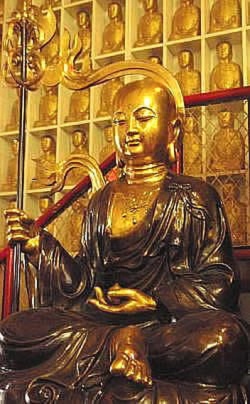Difference between revisions of "Buddha of beneficence"
(Created page with "thumb|250px| <poem> Buddha of beneficence [他受用身] ( Jpn tajuyushin ) Also, body of beneficence. One of the four bodies of a Buddha. These four bo...") |
|||
| (8 intermediate revisions by 3 users not shown) | |||
| Line 1: | Line 1: | ||
[[File:Es20.jpg|thumb|250px|]] | [[File:Es20.jpg|thumb|250px|]] | ||
| + | |||
| + | |||
| + | |||
| + | |||
| + | |||
| + | |||
<poem> | <poem> | ||
| − | Buddha of beneficence | + | [[Buddha of beneficence]] |
| − | [他受用身] ( Jpn tajuyushin ) | + | [[他受用身]] ( Jpn [[tajuyushin]] ) |
| + | |||
| + | Also, [[body]] of beneficence. One of the four [[bodies]] of a [[Buddha]]. These four [[bodies]] correspond to the [[three bodies]]. They are | ||
| + | |||
| + | :(1) the [[self-nature body]], which corresponds to the [[Dharma body]]; | ||
| + | :(2) the [[body of self-enjoyment]], which corresponds to the [[reward body]]; | ||
| + | :(3) the [[body of beneficence]], which also corresponds to the [[reward body]]; | ||
| + | :(4) the [[transformation body]], which is similar to the [[manifested body]]. | ||
| + | |||
| + | A [[Buddha]] of beneficence is one who responds to the people's [[desire]] and benefits them through the various teachings that they {{Wiki|hope}} to hear. This {{Wiki|concept}} of [[Buddha]] is contrasted with that of a [[Buddha]] of self-enjoyment, who enjoys [[enlightenment]] [[attained]] as a result of {{Wiki|past}} [[meritorious]] acts, such as [[Shakyamuni]] when he [[attained]] [[enlightenment]] under the [[bodhi tree]]. | ||
| − | + | See also; [[Buddha of limitless joy]]; [[Buddha of self-enjoyment]]. | |
</poem> | </poem> | ||
{{R}} | {{R}} | ||
Latest revision as of 02:32, 11 March 2024
Buddha of beneficence
他受用身 ( Jpn tajuyushin )
Also, body of beneficence. One of the four bodies of a Buddha. These four bodies correspond to the three bodies. They are
(1) the self-nature body, which corresponds to the Dharma body;
(2) the body of self-enjoyment, which corresponds to the reward body;
(3) the body of beneficence, which also corresponds to the reward body;
(4) the transformation body, which is similar to the manifested body.
A Buddha of beneficence is one who responds to the people's desire and benefits them through the various teachings that they hope to hear. This concept of Buddha is contrasted with that of a Buddha of self-enjoyment, who enjoys enlightenment attained as a result of past meritorious acts, such as Shakyamuni when he attained enlightenment under the bodhi tree.
See also; Buddha of limitless joy; Buddha of self-enjoyment.
